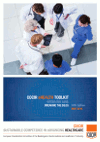 COCIR has launched the newest edition of its eHealth Toolkit, subtitled 'Integrated Care: Breaking the Silos'. This year's toolkit focuses on the value of Integrated Care, the challenges in implementing it and how health ICT technologies and procurement possibilities can facilitate it. The toolkit outlines supporting IT concepts, such as Cloud Computing and Managed Services, which will help Integrated Care becoming a reality. As communication and data sharing among healthcare providers and citizens remains increasingly important we also continue to analyze how interoperability can contribute to an efficient integrated care model.
COCIR has launched the newest edition of its eHealth Toolkit, subtitled 'Integrated Care: Breaking the Silos'. This year's toolkit focuses on the value of Integrated Care, the challenges in implementing it and how health ICT technologies and procurement possibilities can facilitate it. The toolkit outlines supporting IT concepts, such as Cloud Computing and Managed Services, which will help Integrated Care becoming a reality. As communication and data sharing among healthcare providers and citizens remains increasingly important we also continue to analyze how interoperability can contribute to an efficient integrated care model.
The launch was taking place during the EU eHealth Week in Riga, under the Latvian Presidency on 11-13 May, where various health ICT representatives from EU Member States met and discussed topics such as the future of mHealth and patient engagement.
Nicole Denjoy, COCIR Secretary General, said, "We are delighted to publish this year our 5th eHealth toolkit focusing on integrated care and want to outline how important it is to break silos. COCIR will continue to lead the health ICT industry voice and to share its competencies to show the importance to adopt and deploy eHealth solutions and to use data efficiently and smartly in relation to healthcare, as recently outlined in our call for action for a Better healthcare in Europe. This will remain important and we know our industries will make a difference, especially in the context of the Digital Single Market."
Download: COCIR eHealth Toolkit 2015 (.pdf, 4.317 KB).
Download from eHealthNews.eu: COCIR eHealth Toolkit 2015 (.pdf, 4.317 KB).
About COCIR
COCIR is the European Trade Association representing the medical imaging, health ICT and electromedical industries. Founded in 1959, COCIR is a non-profit association headquartered in Brussels (Belgium) with a China Desk based in Beijing since 2007. COCIR is unique as it brings together the healthcare, IT and
telecommunications industries.